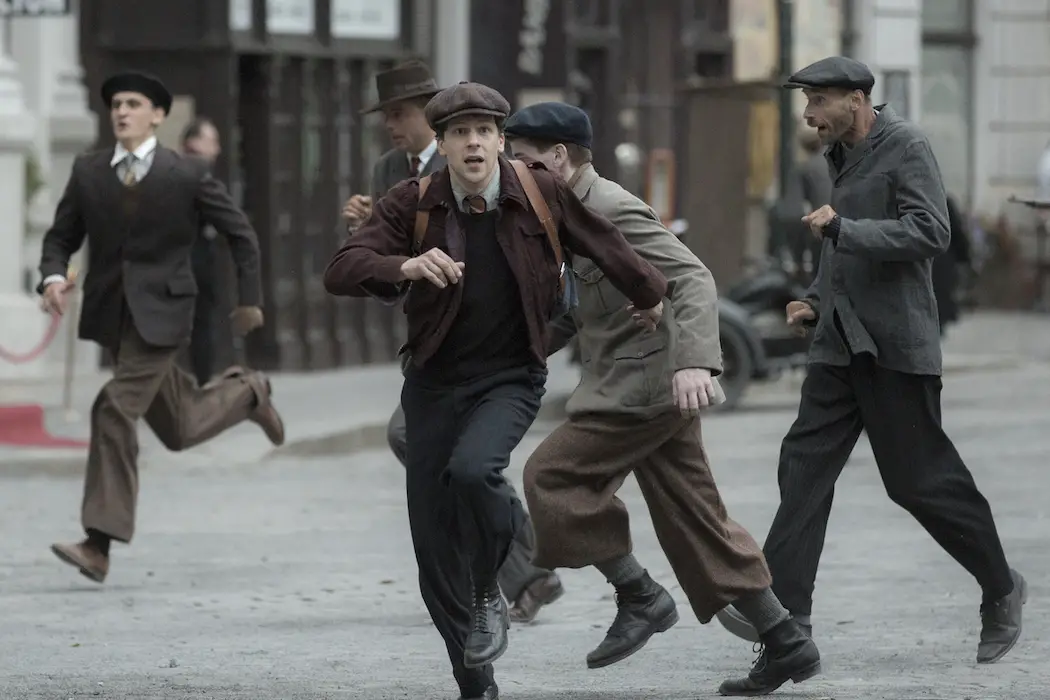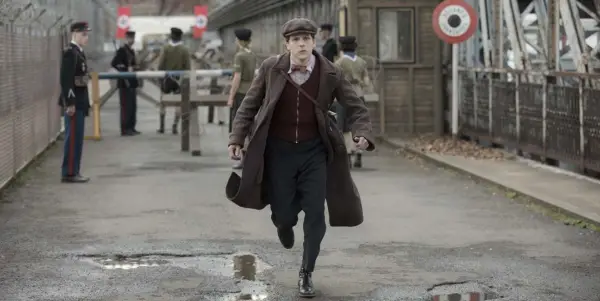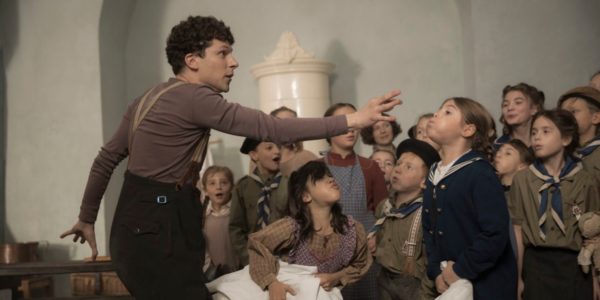RESISTANCE: Well-Intentioned But Ill-Focused

Aspiring journalist and film critic based in the SF Bay…
It’s been many years since Jesse Eisenberg broke free from his typecast shackles. Once largely known as the geeky teen on-screen, he’s cast his net farther and ventured into more serious territory that allows him to develop his acting in a more austere setting, from his Oscar nominated turn in The Social Network to his dual role in The Double. He’s gathered both acclaim and criticism following various risks, but Resistance, directed by Jonathan Jakubowicz, is arguably the farthest he’s ever reached.
Set in occupied France during the Holocaust, Eisenberg dons period clothing and a questionable French accent to play Marcel Marceau: a mime who joined the French Resistance and helped bring Jewish orphans to safety. Undulating between awkwardly hit emotional beats and unsure transitional moments, it’s a film that struggles to find its footing, though Eisenberg in his starring role is always there to break its fall – for better or worse.
Jewish Lifestyle Interrupted
The film opens up on a wall hanging with Hebrew text, then panning down to a father reading to his daughter, Elisabeth (Bella Ramsay) in bed, effectively painting a portrait of Jewish domesticity and peace — which is sharply cut off when moments later, their house is broken into and Elisabeth’s father and mother are both killed. It’s a brutal but honest preface to the story, which roots itself in Jewish tradition to better portray the protagonists and their struggle against injustice.
Marceau blows a shofar gleefully at one point, leading a crowd of children as they chant in Hebrew. There’s also an emphasis on Jewish law and tradition, and how it’s changed in the face of adversity. In an unsure moment when the adults discuss whether it’s okay for the children to hide in a church, Alain (Felix Moati) states that the Jewish law may be broken in life-threatening situations, and that’s exactly what they’re facing.

This depiction of Jewish culture is most abundant in the film’s more subdued first act, as the intensity ramps up as film goes on and veers into thriller territory with varying success. A tense train scene stands out as a high point, as the orphans and adults travel under disguise and are stopped and scrutinized by officer Klaus Barbie (Matthias Schweighöfer). But more often than not, this shift causes the film to stumble, as it attempts to dart between various tones and largely fails.
Eisenberg Wasted
Some of the strangest choices in the film are structural, such as the frame narrative (featuring Ed Harris for a whopping five minutes) and the awkward intercutting of expositional text and film during time jumps, evocative of a low budget documentary. But it’s most heavily hurt by the way it distributes its focus among characters. Emma (Clemence Poésy) is one such, acting as a half-baked love interest. She and Marceau engage in a shaky will-they-wont-they for much of the film’s runtime that is sharply out of place with the graveness of the film.
Officer Barbie is another, an antagonist whose storyline intersects with the protagonists, but is also depicted outside of those interactions (his relationships with his wife and child briefly shown). These diverge from the core storyline and take precious time away from developing Marceau himself.

The film is torn between a figure-based biopic and a broader period piece thriller in a way that completely muddies the plot. Eisenberg‘s depiction of Marceau (however rough his French accent may be) is earnest, but is done little justice by the clumsy screenplay. His artistic interests are most prominently featured in the first act, in gleeful sequences where he uses his mime talent to bring joy to the children (evocative of Life Is Beautiful) but they’re almost completely abandoned after, serving little purpose in the storyline despite being so heavily set up. He’s dubbed the “Most Important Mime Of All Time” at the film’s closing, but it feels like an after-thought rather than a true union of his art with his role in the resistance. Though Eisenberg has evident fun playing Marceau and gives a solid performance with what he’s given (excluding the French accent which is so horrendous I have to point it out a third time), he’s dragged down by poor character development and haphazard writing.
Resistance: Conclusion
If it were possible to summarize all the film’s issues in a single statement, it would be that it simply doesn’t know what to do with itself. It completely squanders the opportunity to elevate a remarkable and under appreciated historical figure by setting its gaze too far. Holocaust-set films exist in abundance, each illustrating the deep strife of the period to varying degrees of success, and this film sadly fails — as both an effective vehicle for its lead actor to show off his full range and a genuine depiction of Marcel Marceau’s heroism in the French Resistance.
Do you think Resistance treats its subject appropriately? Is Jesse Eisenberg’s performance worthy of accolades? Let us know in the comments below.
Resistance was released on VOD on March 27, 2020. It’s available on Amazon, iTunes, Vudu and Microsoft Store.
Does content like this matter to you?
Become a Member and support film journalism. Unlock access to all of Film Inquiry`s great articles. Join a community of like-minded readers who are passionate about cinema - get access to our private members Network, give back to independent filmmakers, and more.
Aspiring journalist and film critic based in the SF Bay Area. Loves Guillermo Del Toro, Bong Joon-Ho, and any film with an impromptu dance number.













